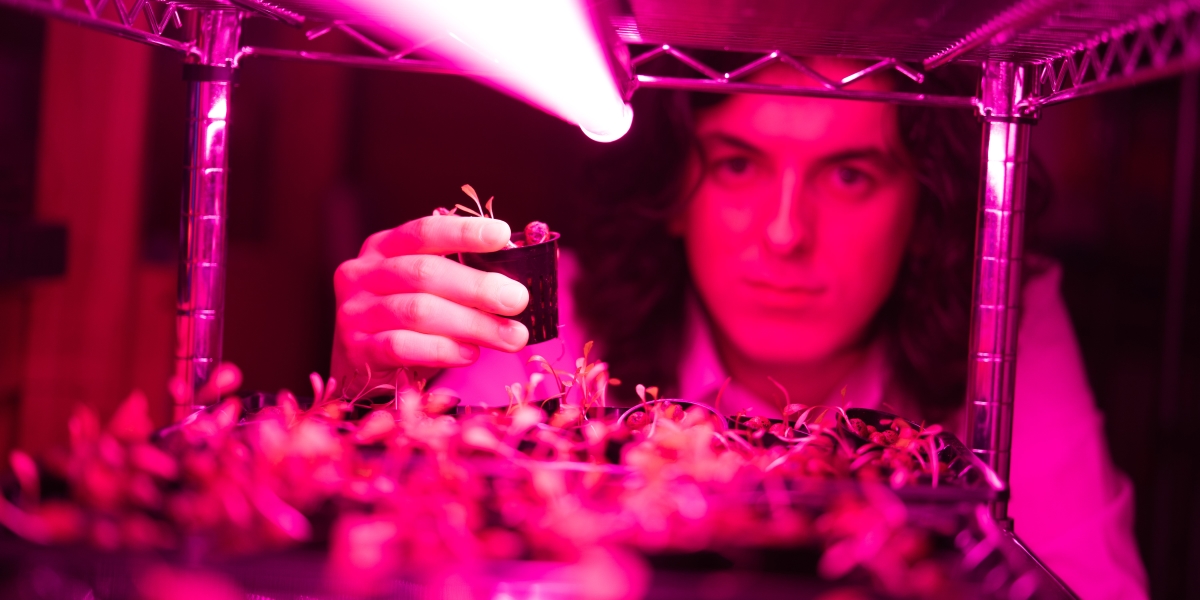SUMMER 2023
Seedlings of a Big Idea
Before Denver Backus '23 could even approach his goal of building a hydroponic farm that provides food to communities in need of fresh, healthy produce, he had to start small.
- Story by Karen Bridges

Photo by Chris Brecht
BEFORE ENGINEERING STUDENT Denver Backus '23 could even approach his goal of building a hydroponic farm that provides food to communities in need of fresh, healthy produce, he had to start small. He had to learn how to grow food. And he needed space to do it. So he started in his grandmother's barn in Eastern Washington. "I built my first indoor farm over the winter," he said. "I harvested my first head of lettuce last February, with six inches of snow on the ground."
Hydroponic is Latin for "working water" and it is a method of growing plants that doesn't require soil. Instead, they are grown in containers, indoors, year-round, with various kinds of nutrient solutions. With support from Dean Brian Fabien, Backus now has a small hydroponic farm growing in the basement of the Shiley School of Engineering and another growing in his off-campus garage. (He also has a team working on engineering robots that can harvest crops in a cost-effective way.)
His ultimate goal is to be able to send hydroponic farming systems in shipping containers with culturally specific produce anywhere in the world. And his target is food deserts-both near and far. Defined by the USDA as houses without vehicle access located in urban areas with more than one-half mile from the nearest supermarket, food deserts are present even in Portland, a city renowned for its culinary delights, from gourmet restaurants to food carts.
And Backus's plan goes beyond delivering basic essentials. The plants need to resonate with the community they are being delivered to-it needs to be food they'd actually want to grow and eat. There needs to be a team ready to receive the container, a team that's been trained in hydroponic farming practices, and who can share that skill and engage others. There are complicated, nuanced human and cultural factors in addition to the engineering challenges.
His sprouting ideas of farming robots have grown to a multi-disciplinary capstone team, which is currently working to help him grow the business side of his ideas and research. In 2022 he earned the top prize in the "Invention" category for the Pilot Venture Challenge. He founded a non-profit and an LLC to get research grant funding faster and expand access to research opportunities. All this, and he's just wrapping up his junior year.
There's still a long road ahead before he can send out the first shipping container. He's working to diversify the types of plants that can be grown and shipped, learning to navigate the global supply chains, and in finding eco-firendly ways to ship the containers. But Backus is intent on following through on this plan-and with intention. "We're delivering a system of growing food, not just a container of food," he explains. "It's about the community growing food for the community."
KAREN BRIDGES is UP's marketing & communications coordinator.
More Stories
The First Real Six-String
The story of an instrument and two of its makers, more than a century apart.
- Story by Cheston Knapp
A Sacred & Historic Space
Dean’s Beauty Salon and Barber Shop was recently placed on the National Register of Historic Places. Founded by the parents of UP Regent and alum Kay Dean Toran, this business and its staying power tell a story about Black history—and Black success—in Portland.
- Story by Rosette Royale